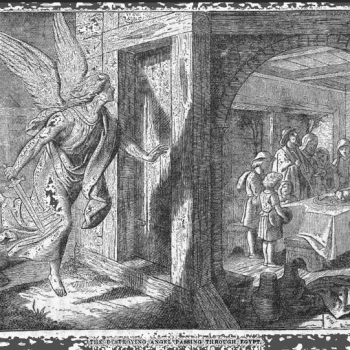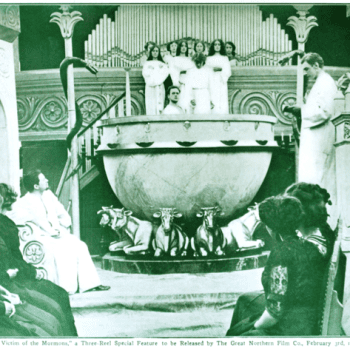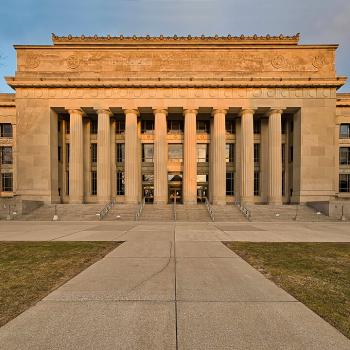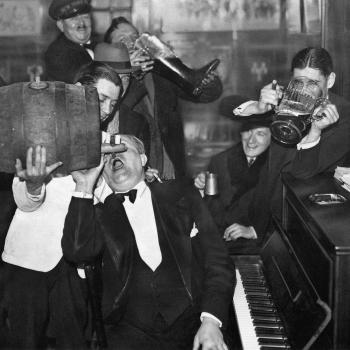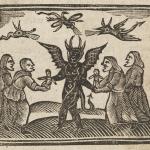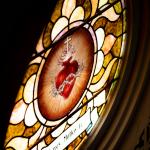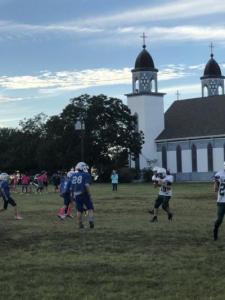 A country church burned to the ground last week. Flames billowed over its wooden spires in a scene reminiscent of Notre Dame. But while stone defended the Parisian cathedral, the timber walls of the Church of the Visitation in Westphalia, Texas, didn’t stand a chance. Winds blustered that morning, fanning the fire and ensuring total destruction.
A country church burned to the ground last week. Flames billowed over its wooden spires in a scene reminiscent of Notre Dame. But while stone defended the Parisian cathedral, the timber walls of the Church of the Visitation in Westphalia, Texas, didn’t stand a chance. Winds blustered that morning, fanning the fire and ensuring total destruction.
I only visited the church once. It was pure chance. My son plays football, and one of games last year was played on a muddy field stretching right up against the wooden walls of the almost 125-year-old church. I snuck away at halftime and found the doors still open. A church member was inside. ‘Only 15 minutes, please,’ she warned.
It was a lovely 15 minutes. The hand painted walls an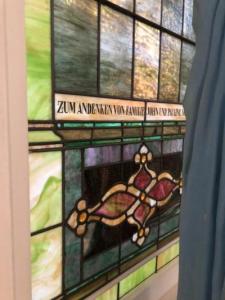 d hand carved pews told the story of the German immigrants who fought to build a piece of their European faith in the middle of nineteenth-century Texas. The timber was local–brought by train from my home town of Waco. The parishioners had to haul the building supplies from the neighboring train station in Lott–all 80 cart loads. Yet the stained glass of the 20 windows, as well as the main altar, was not local. They shipped directly from Germany. I can only imagine the cost.
d hand carved pews told the story of the German immigrants who fought to build a piece of their European faith in the middle of nineteenth-century Texas. The timber was local–brought by train from my home town of Waco. The parishioners had to haul the building supplies from the neighboring train station in Lott–all 80 cart loads. Yet the stained glass of the 20 windows, as well as the main altar, was not local. They shipped directly from Germany. I can only imagine the cost.
The medieval historian in me paused for longer than I should have at the Relic of the True Cross. I didn’t get a good enough picture of the inscription, but from what I can remember, the church acquired it in 1954–an authenticated piece of the cross of Jesus carried thousands of miles to Texas. They housed the fragile wood in a beautiful reliquary, framed near the authenticating certificate. News stories report that this relic, along with almost everything 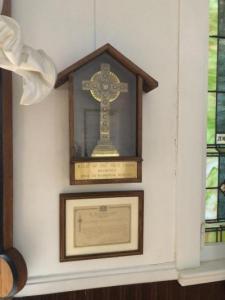 else inside the church, was lost to the flames.
else inside the church, was lost to the flames.
As I clicked through images of the burning Texas church, I couldn’t help but think about Notre Dame. The world watched, grieving, as the spire of Notre Dame collapsed, but only a few thousand people (at most) know about the rounded church spires destroyed last week in Texas.
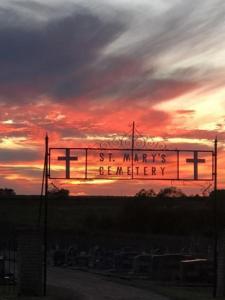 I know that the Church of the Visitation was just as important to the Texas souls it served as Notre Dame was to the medieval Christians in Paris. In both, families were baptized, married, and buried. In both, people worshipped God, mourned their sins, and forgave their neighbors. One local firefighter’s description of the church as his family’s “home” echoed the words of a church deacon, “The Church of the Visitation was the community and the community was the church.”
I know that the Church of the Visitation was just as important to the Texas souls it served as Notre Dame was to the medieval Christians in Paris. In both, families were baptized, married, and buried. In both, people worshipped God, mourned their sins, and forgave their neighbors. One local firefighter’s description of the church as his family’s “home” echoed the words of a church deacon, “The Church of the Visitation was the community and the community was the church.”
But, despite the local importance of the country church, I know as a historian that Notre Dame will be remembered by far more people than the church in Westphalia. Why? Because far more people know about the Notre Dame Cathedral in Paris than they do about a country church in the U.S. Southwest. Because Paris plays a central role in the historical landscape of Europe, whereas Westphalia, Texas never even had its own train station. Because countless historians, antiquarians, government and church officials, and even everyday people have preserved the history of Notre Dame, whereas I found less than 20 direct references in a google book search for the Westphalia Church of the Visitation (and mostly very brief).
History forgets much more than it remembers. And what it remembers is often what people have chosen to preserve.
Which is why, I think, evangelical Christians have forgotten the history of women in Christianity: because we haven’t bothered to preserve it.
Just last Spring, Chesna Hinkley published an illuminating article about how poorly evangelicals have preserved the history of women. After examining every issue of the Journal of the Evangelical Theological Society from 1988-2018 as well as the conference proceedings across the same years, Hinkley found women were included in just 2% of all history content. As she writes, “In contrast to the mere 29 articles, book reviews, and conference presentations on women in the whole history of the church, over the same period I counted 137 articles on Jonathan Edwards alone.” Likewise, in her study of 15 evangelical seminaries, she found that women constituted only 2.2% of the subject matter. “Men who train at these schools learn nothing about women academically, leaving them with the impression that women have been unimportant–indeed, unnecessary–throughout Christian history.”
Not only are evangelicals failing to preserve women’s history, we are failing to teach it to our male leaders. Without courses or content on women’s history, as Hinkley writes, “men are never asked to interact with the ways in which women” do not conform to complementarian theology.
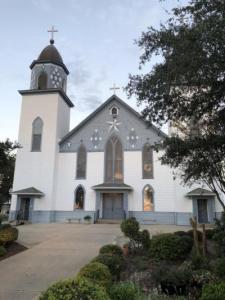 I am a hopeful person. I am just as hopeful for the resurrection of the church in Westphalia as I am for Notre Dame. Enough people care about both to preserve and to rebuild. While more people will always know about Notre Dame, I don’t think the Church of the Visitation in Westphalia, Texas, will be forgotten. The community will make sure it is remembered and resurrected.
I am a hopeful person. I am just as hopeful for the resurrection of the church in Westphalia as I am for Notre Dame. Enough people care about both to preserve and to rebuild. While more people will always know about Notre Dame, I don’t think the Church of the Visitation in Westphalia, Texas, will be forgotten. The community will make sure it is remembered and resurrected.
Isn’t it time evangelicals do the same for women?
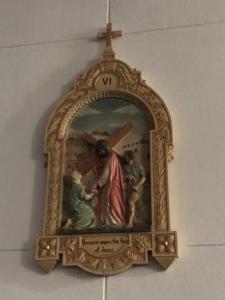 By remembering our past, I am hopeful we can change our future. I think it is time to write women back into evangelical history.
By remembering our past, I am hopeful we can change our future. I think it is time to write women back into evangelical history.
Stay tuned! I will wrap up my Disrupting Christian Patriarchy series this Fall.




